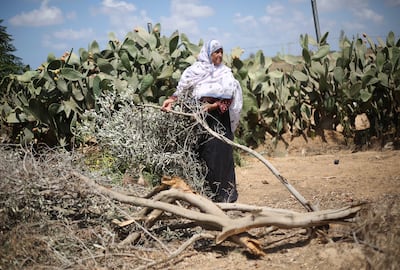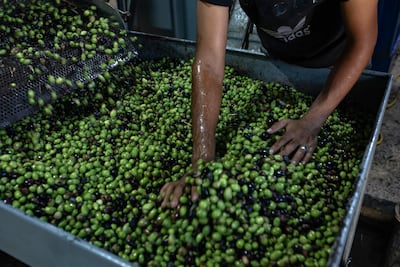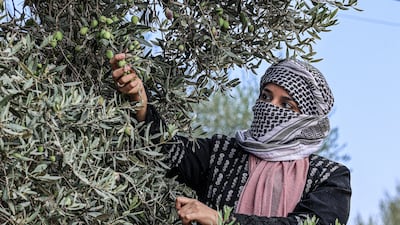Mahdi Al-Masri longs to go to his land in the east of Beit Hanoun, where 13 years ago he planted more than 300 olive trees. But as Israel's war on Gaza rages, his dream of harvesting olives has been shattered.
The farmer has managed to reach his olive grove in north-eastern Gaza only once since the war began a year ago, travelling during a brief truce in November 2023. Since then, Israeli forces have bulldozed the area and stationed heavy machinery there.
Mr Al-Masri, 46, has been displaced by the war and now lives in Jabalia camp with his 11 children. He told The National that he previously harvested "some of the best Souri olives" on his land and he holds on to the hope that the fighting will end so he can return to his home.
Gazan farmer
"My sorrow over the olive trees is immense. Every year, we would wait for the harvest season. The entire year was dedicated to those trees – caring for them, watering them, constantly tending to them," he said.
The olive season was not simply about tradition for Mr Al-Masri. It was a vital source of income for his family. "We would press the olives for oil, which was of very high quality and in demand," he explained.

Palestinian heritage
Each time he sees olives in the market now, it fills him with sadness. "I remember my land and long for those days to return, for the season to come back," he said. "I just want this war to end so I can plant my trees again. The olive tree is our connection to the land, it’s our history and heritage."
Hope had taken root in Beit Lahia, northern Gaza, where Mohammed Fadous, 49, returned to his land to find some of his olive trees still standing. He worked hard to revive them and they bore olives.
But the danger was far from over. "We started harvesting about a week ago, but unfortunately the Israeli forces didn’t leave us in peace," he told The National. "They shot at us several times and drones hovered overhead. On two separate days, I had to leave with my children and workers before finishing, fearing for our lives."
Despite the danger, Mr Fadous remains committed to his olive trees. "It’s a Palestinian tradition," he added. "I went to pick olives to preserve our heritage and to affirm that, despite everything, we will continue to protect our history."
Hossam Abu Nasser, a Palestinian historian and writer in Ramallah, said olive trees offer Palestinians a link to the past and a deep connection to their land. "Olive trees are one of the oldest crops in Palestine, dating back to the Canaanites, and they are mentioned in the Quran," he told The National.
“The olive season is an inheritance passed down through thousands of years. It's not just an agricultural season, but a cultural one, rich with stories and traditions. They symbolise both peace and conflict."
Israeli attacks on farmers and their harvests are an attempt "to erase this deep connection to the land", he said.
The olive harvest is "a key economic, social and cultural event for Palestinians", the UN Office for the Co-ordination of Humanitarian Affairs said in a report this year. Israel, as an occupying power, "should ensure that Palestinians are able to participate in, and fully benefit from, this activity. This includes ensuring that farmers can access their olive trees throughout the year, and that their trees and agricultural property are protected from damage and theft," it added.

'Green gold'
Olives also play a crucial role in Palestine’s economy, Mr Abu Nasser said. "For us, the olive season is a celebration of our heritage and, each year, olives represent Palestine's 'green gold' for the economy," he explained.
Anas Jarada, 27, an olive seller in Al Sahaba Market in Gaza city, is well aware of the economic impact of the conflict on the harvest. Olive prices have nearly tripled as supplies dwindle, with people unable to buy large amounts as they once did, he said.
"In previous years, people would buy 30kg or 40kg of olives, especially if they had large families," he told The National. "But this year, they’re only buying 1kg to 2kg at most."
Mr Jarada said the market only had two types of olives available – Ki 18 and Souri. Prices for the first type range from 10 to 20 shekels for every kilogram ($2.70 to $5.40), while the second costs between 20 and 35 shekels for every kilogram.
Supplies come from small home gardens and individual trees. "There are no large farms left to bring big quantities," he added. "Most of the olive groves are in border areas that have been bulldozed by Israeli forces."
In northern Gaza, Mahmoud Sabra supervises the last operational olive press in the area. His family’s olive press, which has been running since September 13 last year, can process between 50kg and 120kg of olives at a time.
"We’ve only pressed two tonnes of olives since opening, and most of the product comes from home gardens or trees between buildings," he told The National. "The larger farms have been destroyed and farmers can’t reach their land because it’s too dangerous."
The cost of pressing olives has surged due to the high price of diesel and the need to run generators. "It’s almost five times more expensive now, costing about 2.5 shekels per kilogram of olives," he said. "We have to buy diesel from the black market, where a litre costs 88 shekels."
Adding to the challenges, there are no containers to store the olive oil, due to the Israeli blockade. Gazans are instead forced to use unsuitable containers, such as old chlorine or dish soap bottles.
Despite the rising costs and scarcity, the demand for olive oil remains strong. The price of pressed olive oil has reached 90 shekels for 1kg – three times its normal price.


